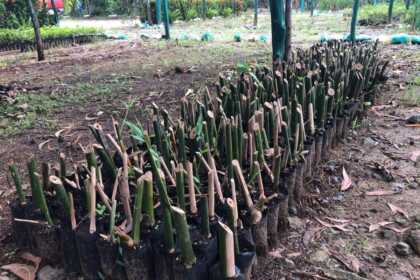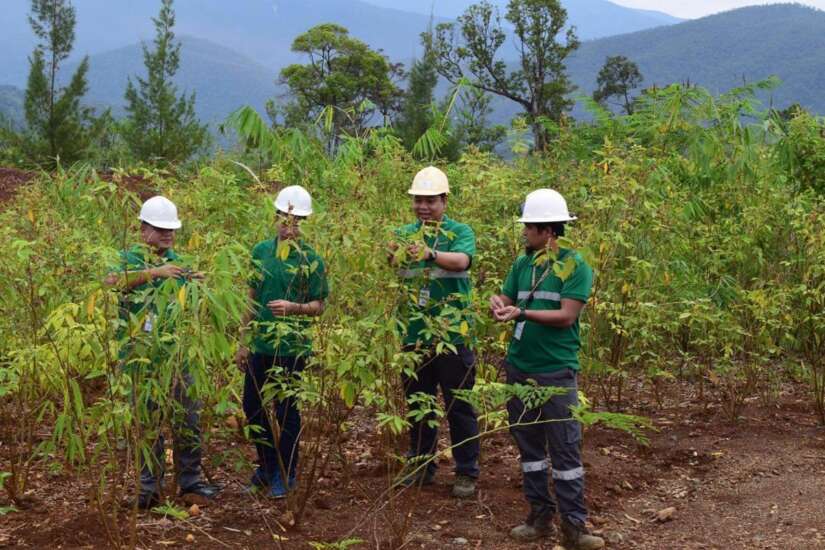MMDC, BNMI BACK DUTERTE, CIMATU
TWO of the country’s leading mining firms responsible for the extraction of minerals on Monday expressed strong support for Environment Sec. Roy Cimatu’s call to provide additional areas for bamboo plantations as part of the Duterte administration’s post-coronavirus disease-19 (COVID-19) recovery efforts.
Marcventures Mining and Development Corp. (MMDC) and BenguetCorp Nickel Mines Inc. (BNMI) welcomed the decision of the Department of Environment and Natural Resources’ (DENR) requiring mining firms to double their areas allotted for bamboo plantations from 10 percent to 20 percent of the declared final mining area as part of the government’s economic recovery program amid the pandemic.
The DENR made the order through a June 11, 2020 memorandum issued by the Mines and Geosciences Bureau (MGB) to all mining firms in the Philippines, one of the most highly mineralized countries in the world, titled “Establishment of Bamboo Plantation in Mining Areas” to address soil erosion, landslides and flooding which are common disasters in any mine site.
In fact, MMDC, a wholly-owned subsidiary of listed Marcventures Holdings Inc. (MHI), pioneered the planting of bamboo trees in Surigao del Sur as this would provide livelihood, huge environmental benefits, absorb greenhouse gases and protect the soil.
“Marcventures is the acknowledged pioneer among mining companies in bamboo planting and has been cited by the DENR, and so far, with biggest bamboo planting area. The DENR has now mandated the planting of bamboo as a major activity for mine rehabilitation,” said Isidro C. Alcantara, President & Director of MHI, which has mining operations in Cantillan, Carrascal and Madrid in Surigao del Sur.
With the celebration of World Bamboo Day (WBD) this September 18, MHI has already planted a total of 34,375 bamboo seedlings covering over 54.3 hectares.
Currently growing at the mined out areas are Giant Bamboo (Dendrocalamus giganteus) and Kawayang Tinik (Bambusa blumeana), the two commercially viable varieties.
“Marcventures has pioneered bamboo planting in the mined-out areas and possibly in the non-mineralized as a potentially permanent livelihood to sustain the communities beyond the life of Marcventures,” Alcantara said.
“In Marcventures, we describe our mining as clean and sustainable mining in addition to responsible mining,” Alcantara pointed out. “We are therefore committed to sustain our business by practicing clean and sustainable mining.”
“Marcventures Holdings, Inc. continues to integrate its mining activities with programs that promote environmental protection and sustainable development of our host communities. We are committed to transform mined-out areas into productive agricultural lands,” he said.
In 2017, Alcantara recalled that Marcventures embarked on a Bamboo Plantation Development plan to help the community tap the country’s bamboo industry.
“It was promoted by the DENR at the initiative of Secretary Roy A. Cimatu for mine rehabilitation and the company pioneered the planting of bamboo in mined-out areas. The goal is to generate an income generating bamboo business anchored on the rehabilitation plan,” said Alcantara who stressed that bamboo farming is the heart of their mining rehabilitation program.
“MHI is also the leader in the propagation of bamboo as a sustainable and rewarding livelihood project for communities. Bamboo nurseries and revegetation are carried out to restore disturbed areas with the goal of returning the land to its natural state after operations. Fully-committed to forging partnerships for sustainable development, MHI leads the propagation of bamboo as a livelihood project endorsed by the DENR,” Alcantara explained.
In 2018, Alcantara said Marcventures formed the Pili Kawajan Association (PKJ) composed of community members to manage the company’s bamboo plantation.
“PKJ also completed a service excellence training that aims to strengthen their capacity to grow the bamboo plantation business,” he said. “Also known as the grass of hope bamboo, it has a wide range of application. It can be used for furniture, clothing fiber, pulp and paper products, food ingredients, beauty products, architecture and construction.”
BENGUET CORPORATION

For BNMI, a wholly-owned subsidiary of Benguet Corp., the said bamboo planting project will provide opportunities for local employment and establish bamboo-based community enterprise for home decors and furniture.
“This will help promote environmental wellness amid the pandemic and provide livelihood for the people,” BNMI said. “Bamboo forests, aside from conserving biodiversity, contribute to purification and regulation of the environment as they function as carbon sink.”
BNMI said it has complied with the DENR’s directive and propagated an approximate 30,000 bamboo culms/seedlings of mixed species of Kawayang Tinik, Bayto, Boho and Kawayang Dilaw in Sitio Binagbag, Bgy. Guisguis, Sta. Cruz, Zambales.
MARCVENTURES’ GOOD GOVERNANCE AND ADHERENCE TO MINING LAWS
For Marcventures, Alcantara said there are two major areas of sustainability for mining centric businesses.
“Of great importance to us is environmental compliance because we are in a protected watershed. We ensure strict adherence to environmental restoration and rehabilitation. Our waters are clean, which is true test of responsibility mining, and children play in our rivers and women wash there also,” Alcantara said.
“First, the long-term sustainability of the businesses of MHI and the nickel mines in Surigao del Sur itself through good governance and adherence to mining laws and regulations and ensuring faithful compliance to our economic and social obligations to the country: and, second, and of co-equal importance, if not more into beyond our corporate life, is the sustainability of the communities where we do business including their continuing livelihood, restoring and enhancing the environment for their future use and uplifting the standards of living in the host communities,” Alcanta stressed.
“The first part of sustainability is driven and achieved by the way we do mining relative to Universal Standards of Responsible Mining and the Unique Factors of Nature where we are. This covers our operating and business processes, our compliance with environmental laws, our compliance with mining laws and regulations and our endeavor to always consider the interests of the local communities. Specific areas of we always and consistently focus on are water resource and air quality management, corporate social responsibility, management of our people including health and safety, principles of good governance to guide all our corporate acts and lastly community engagement that always considers the common and greater good of the Peoples around us especially the Indigenous Peoples,” Alcantara explained.
BENEFITS OF MINING UNDER MARCVENTURES’ CARE
While mining activitiew are ongoing, Alcantara said Marcventures provides jobs, health care, education through one of the largest scholarship programs up to college and through a community high school, community enhancement through the government’s social development management program (SDMP) and through IP royalties and taxes.
“We have initiated and continue to create livelihood programs. We tell ourselves there has to be something more substantial and more permanent. This is where the second part of our sustainability proposition may be answered,” Alcantara explained. “We intend to make this the center piece of what we feel is the probably more important part of sustainability for mining companies —to leave something permanent and meaningful to enhance people’s lives when the mining stops. We are excited about the prospects of sustainability not just of our businesses but the creation of a sustainability structure for the communities we touch.”
“We pray for Divine Providence to guide and help us realize a sustainable future for the people under the responsibility of Marcventures,” he said.
Alcantara also assured that the host and neighboring communities will continue to thrive even after mining activities have drawn to a close.
“MHI considers mine rehabilitation as an important factor in sustainability. Apart from the initiatives to restore and enhance mined-out areas to its natural state, it is important to leave a sustainable livelihood for the community even after mining has stopped,” Alcantara stressed.
“The company is also working with the Philippine Bamboo Foundation to conduct trainings on bamboo propagation, nursery establishment, and business management of small enterprises to be organized among the surrounding communities,” he said.

